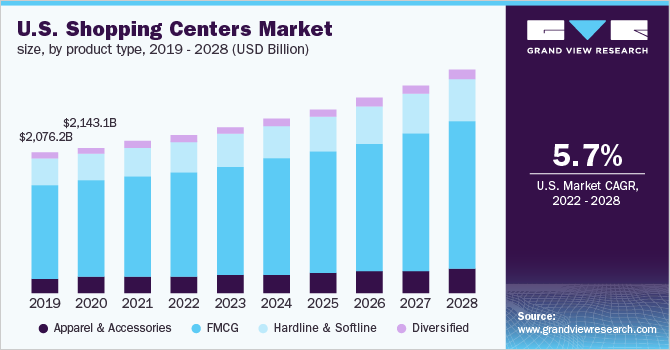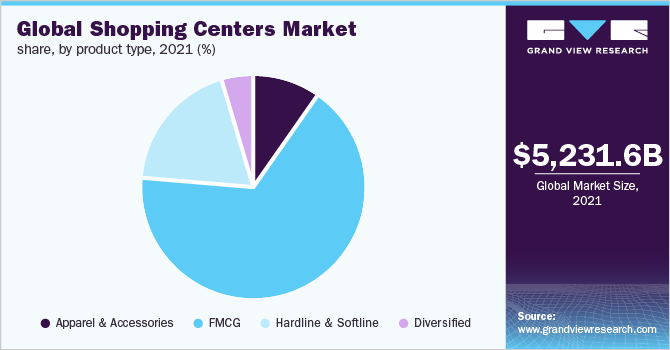- Home
- »
- Clothing, Footwear & Accessories
- »
-
Shopping Centers Market Size & Share Report, 2028GVR Report cover
![Shopping Centers Market Size, Share & Trends Report]()
Shopping Centers Market (2022 - 2028) Size, Share & Trends Analysis Report By Product Type (Apparel & Accessories, FMCG, Hardline & Softline, Diversified), By Region, And Segment Forecasts
- Report ID: GVR-4-68039-929-9
- Number of Report Pages: 85
- Format: PDF
- Historical Range: 2017 - 2020
- Forecast Period: 2022 - 2028
- Industry: Consumer Goods
- Report Summary
- Table of Contents
- Segmentation
- Methodology
- Download FREE Sample
-
Download Sample Report
Shopping Centers Market Summary
The global shopping centers market size was valued at USD 5,231.63 billion in 2021 and is projected to reach USD 7,797.36 billion by 2030, growing at a CAGR of 5.9% from 2022 to 2028. Shopping centers are gaining popularity because they include clothing stores, foods, a variety of collections from different retailers or vendors, and much more in one place. This is the major factor driving the market growth.
Key Market Trends & Insights
- North America accounted for the highest market revenue share of over 46% in 2021.
- Asia Pacific is forecast to register the highest CAGR of 6.7% from 2022 to 2028.
- Based on type, the FMCG segment dominated the market and contributed to a revenue share of more than 66% in 2021.
- In terms of product, the apparel and accessories segment is expected to witness the highest CAGR of 6.6%.
Market Size & Forecast
- 2021 Market Size: USD 5,231.63 Billion
- 2028 Projected Market Size: USD 7,797.36 Billion
- CAGR (2022-2028): 5.9%
- North America: Largest market in 2021
Moreover, shopping centers provide a better consumer experience, allowing them to gain access to various practices such as new product launches, festivals, and events. The COVID-19 outbreak negatively impacted the market for shopping centers. During COVID-19, the shopping centers around the world remained closed due to strict lockdown and stay-at-home initiatives by various governments. Also, supply chains were disturbed, which affected the global retails to run the business.
A shopping center is a group of various independent retail stores with one or more units under the same building, representing merchandisers, with interconnected walkways allowing visitors to walk from one unit to another. Also, a group of retail stores and services is usually created to serve a community or neighborhood. Consumers can easily search for a product of their interest directly at one place offered by various retailers, or by exploring among alternative stores, which provides them easy access along with easy availability of different goods and products.
Consumers can benefit in several ways by shopping through these centers, including clothing stores, food courts, and much more at a single place by different retailers. Retailers currently offer ship from store capabilities which are attracting consumers to visit shopping centers, thus driving the growth of the market. A shopping center provides customers with an opportunity to look at multiple stores for their purchase needs while being at one destination. Additionally, the emergence of e-commerce platforms and online shopping channels is further contributing to the growth of the market.
The COVID-19 pandemic negatively affected the shopping centers market, with a substantial fall in the number of visitors being witnessed. As per a survey, the top 10 malls of the world noticed a drop of 42% in foot traffic. The revenue generated from shopping malls declined during this period, as the retail sector was hit badly since the outbreak of COVID-19. In the near future, as governments across the world gradually lift lockdown curbs, people are expected to visit shopping malls and stores more often and contribute to market growth.
Product Type Insights
The FMCG segment dominated the market and contributed to a revenue share of more than 66% in 2021, and is expected to maintain its dominance in the coming years. The rising digital connectivity in rural and urban areas is driving the demand for FMCG products among consumers. Moreover, growing awareness, changing lifestyles, and easier access are the key factors for the growth of the consumer goods market.
The increasing global population coupled with rising disposable income and consumption of essential packaged goods in daily life are further driving the segment growth. Moreover, the availability of a large number of food products by various retailers is a major factor that contributes substantially to the market revenue.

The apparel and accessories segment is expected to witness the highest CAGR of 6.6% from 2022 to 2028. The growth of the segment is primarily driven by the easy availability of fashionable items by different retailers, and the rising consumer demand. Additionally, various retailers offer great deals and affordable prices at shopping centers during festive seasons, which is another factor driving the segmental growth.
The strong spending on apparel and accessories by financially independent women across the globe is increasing the market demand in this segment. Thus, the apparel and accessories segment is expected to grow at the fastest CAGR during the forecast period.
Regional Insights
The regional analysis revealed that North America accounted for the highest market revenue share of over 46% in 2021. This can be credited to the rising consumer demand and expansion of the regional retail industry. In North America, rapid urbanization is surging the demand for environment-friendly shopping malls. Shopping centers are popular because they are very convenient and provide a wide variety of products to choose from; this is another factor driving the growth of shopping centers in this region. Thus, the region is expected to grow at a significant CAGR during the forecast period.
Asia Pacific is forecast to register the highest CAGR of 6.7% from 2022 to 2028. The increase in purchasing power of the middle-class population in China and India is attributed to the surge in demand for shopping centers. Additionally, retailers are adopting AI and biometrics in shopping centers to attract consumers and boost revenue. The growth in education level, middle-class income, standards of living, and willingness to spare money by Indians are surging the demand for shopping centers in the region, resulting in its expected fastest CAGR during the forecast period.
Key Companies & Market Share Insights
The market for shopping centers is characterized by the presence of established as well as new players. Major players operating in this market are undertaking mergers and acquisitions as their key strategies. For instance, in June 2017, Amazon completes its acquisition of Whole Foods. The e-commerce juggernaut thus made a significant push into the grocery business. The acquisition suddenly has given Amazon a sprawling brick-and-mortar presence and access to well-heeled consumers.
In addition to that, some of the top market players such as Walmart Inc, Amazon.com, Inc., and Tesco PLC are indulging in extensive product development to gather maximum market share. Some of the prominent players in the global shopping centers market include:
-
Walmart Inc
-
Amazon.com, Inc.
-
Costco Wholesale Corporation
-
Schwarz Group
-
The Kroger Co.
-
Walgreens Boots Alliance, Inc.
-
The Home Depot, Inc.
-
Tesco PLC
Shopping Centers Market Report Scope
Report Attribute
Details
Market size value in 2022
USD 5,474.90 billion
Revenue forecast in 2028
USD 7,797.36 billion
Growth rate
CAGR of 5.9% from 2022 to 2028
Base year for estimation
2021
Historical data
2017 - 2020
Forecast period
2022 - 2028
Quantitative units
Revenue in USD billion and CAGR from 2022 to 2028
Report coverage
Revenue forecast, company ranking, competitive landscape, growth factors, and trends
Segments covered
Product type, region
Regional scope
North America; Europe; Asia Pacific; Central & South America; Middle East & Africa
Country scope
U.S.; Canada; UK; Germany; France.; China; India; Japan; Brazil; Argentina; GCC; South Africa
Key companies profiled
Walmart Inc.; Amazon.com, Inc.; Costco Wholesale Corporation; Schwarz Group; The Kroger Co.; Walgreens Boots Alliance, Inc.; The Home Depot, Inc.; Tesco PLC
Customization scope
Free report customization (equivalent up to 8 analysts’ working days) with purchase. Addition or alteration to country, regional & segment scope.
Pricing and purchase options
Avail customized purchase options to meet your exact research needs. Explore purchase options
Segments Covered in the Report
This report forecasts revenue growth at global, regional, and country levels and provides an analysis of the latest industry trends in each of the sub-segments from 2017 to 2028. For the purpose of this study, Grand View Research has segmented the global shopping centers market report on the basis of product type and region:
-
Product Type Outlook (Revenue, USD Billion, 2017 - 2028)
-
Apparel and Accessories
-
FMCG
-
Hardline and Softline
-
Diversified
-
-
Regional Outlook (Revenue, USD Billion, 2017 - 2028)
-
North America
-
U.S.
-
Canada
-
-
Europe
-
U.K.
-
Germany
-
France
-
-
Asia Pacific
-
China
-
India
-
Japan
-
-
Central & South America
-
Brazil
-
Argentina
-
-
Middle East & Africa
-
GCC
-
South Africa
-
-
Frequently Asked Questions About This Report
b. The global shopping centers market size was estimated at USD 5,231.63 billion in 2021 and is expected to reach USD 5,474.90 billion in 2022.
b. The global shopping centers market is expected to grow at a compound annual growth rate of 5.9% from 2022 to 2028 to reach USD 7,797.36 billion by 2028.
b. North America dominated the shopping centers market with a share of 46.8% in 2021. This is attributable to the popularity of offering different products by various retailers under the same roof along with the renovation of shopping centers integrated with AI.
b. Some key players operating in the shopping centers market include Walmart Inc.; Amazon.com, Inc.; Costco Wholesale Corporation; Schwarz Group; The Kroger Co.; Walgreens Boots Alliance, Inc.; The Home Depot, Inc.; and Tesco PLC.
b. Key factors that are driving the shopping center's market growth include increasing disposable income, the surge in the standard of living, and the willingness to spare money, along with the rising popularity of the shopping centers.
Share this report with your colleague or friend.
Need a Tailored Report?
Customize this report to your needs — add regions, segments, or data points, with 20% free customization.

ISO 9001:2015 & 27001:2022 Certified
We are GDPR and CCPA compliant! Your transaction & personal information is safe and secure. For more details, please read our privacy policy.
Trusted market insights - try a free sample
See how our reports are structured and why industry leaders rely on Grand View Research. Get a free sample or ask us to tailor this report to your needs.










